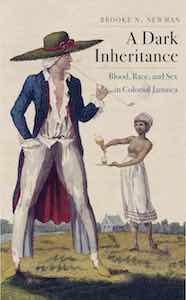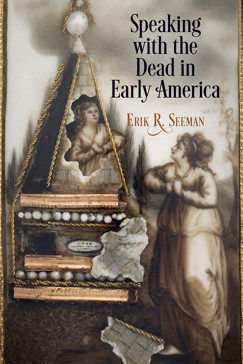Today, The Junto features a Q&A with Brooke Newman,  author of A Dark Inheritance: Blood, Race, and Sex in Colonial Jamaica (Yale, 2018), which was a finalist for the Gilder Lehrman Center’s 2019 Frederick Douglass Book Prize for the best work in English on slavery, resistance, and/or abolition. Her research focuses on the intersections of race, sexuality, and gender in the context of slavery and abolition in the British empire, focusing on the Caribbean. Newman is an Associate Professor of History at Virginia Commonwealth University, where she is also Interim Director of the Humanities Research Center. Look for a review of A Dark Inheritance later this spring.
author of A Dark Inheritance: Blood, Race, and Sex in Colonial Jamaica (Yale, 2018), which was a finalist for the Gilder Lehrman Center’s 2019 Frederick Douglass Book Prize for the best work in English on slavery, resistance, and/or abolition. Her research focuses on the intersections of race, sexuality, and gender in the context of slavery and abolition in the British empire, focusing on the Caribbean. Newman is an Associate Professor of History at Virginia Commonwealth University, where she is also Interim Director of the Humanities Research Center. Look for a review of A Dark Inheritance later this spring.
Tag Archives: Gender
Guest Post: Professional Motherhood: A New Interpretation of Women in the Early Republic
 Today’s guest post comes from C.C. Borzilleri, who is a 2019 graduate of Georgetown University with a BA in History and Government. A lifelong resident of Litchfield, CT, she wrote her senior thesis on the history of women educated in her hometown. She is now working at the Calvin Coolidge Presidential Foundation, a privately funded presidential library with offices in Vermont and Washington, DC.<
Today’s guest post comes from C.C. Borzilleri, who is a 2019 graduate of Georgetown University with a BA in History and Government. A lifelong resident of Litchfield, CT, she wrote her senior thesis on the history of women educated in her hometown. She is now working at the Calvin Coolidge Presidential Foundation, a privately funded presidential library with offices in Vermont and Washington, DC.<
With this year marking the 40th anniversary of Linda Kerber’s Women of the Republic, popularizing Republican Motherhood as an understanding of women in the Early Republic, I propose a supplementary theory to understand women in this time. Kerber’s Republican Motherhood articulated the accepted role of women: the “steady infusion of virtue into the Republic” by raising children to be responsible citizens.[1] This mindset justified the education of women because they were responsible for the early inspiration of their children to care for the new nation. Kerber emphasized the division of public and private space, with the corresponding distinction of the public for men and the private for women. But her theory does not paint the full picture of activities women carried out. Continue reading
Q&A: Erik R. Seeman, Speaking with the Dead in Early America
 Today, the Junto features a Q&A with Erik R. Seeman about his new book, Speaking with the Dead in Early America (University of Pennsylvania Press). Seeman is professor and chair of the history department at the University at Buffalo (SUNY) and the author of three other books on religion and deathways in early America and the Atlantic World. He has also published many articles and essays, including in the William and Mary Quarterly, Journal of the Early Republic, Journal of American History, and Church History. Continue reading
Today, the Junto features a Q&A with Erik R. Seeman about his new book, Speaking with the Dead in Early America (University of Pennsylvania Press). Seeman is professor and chair of the history department at the University at Buffalo (SUNY) and the author of three other books on religion and deathways in early America and the Atlantic World. He has also published many articles and essays, including in the William and Mary Quarterly, Journal of the Early Republic, Journal of American History, and Church History. Continue reading
Q&A: Kate Egner Gruber, Curator of “Tenacity: Women in Jamestown and Early Virginia”
 Today at The Junto, Philippe Halbert interviews Katherine Egner Gruber, who is Special Exhibition Curator at the Jamestown-Yorktown Foundation, a state agency that operates two living history museums in Virginia. This Q&A focuses on her most recent exhibition, Tenacity: Women in Jamestown and Early Virginia, which opened at Jamestown Settlement in November of 2018 and runs through January of 2020. She was also responsible for content oversight of the Yorktown American Revolution Museum‘s award-winning introductory film, Liberty Fever, and contributed to the development of new galleries that opened there in 2015. Kate earned a bachelor’s degree in historic preservation and classical humanities from the University of Mary Washington and a master’s degree in American history from the College of William and Mary. Continue reading
Today at The Junto, Philippe Halbert interviews Katherine Egner Gruber, who is Special Exhibition Curator at the Jamestown-Yorktown Foundation, a state agency that operates two living history museums in Virginia. This Q&A focuses on her most recent exhibition, Tenacity: Women in Jamestown and Early Virginia, which opened at Jamestown Settlement in November of 2018 and runs through January of 2020. She was also responsible for content oversight of the Yorktown American Revolution Museum‘s award-winning introductory film, Liberty Fever, and contributed to the development of new galleries that opened there in 2015. Kate earned a bachelor’s degree in historic preservation and classical humanities from the University of Mary Washington and a master’s degree in American history from the College of William and Mary. Continue reading
Call for Papers: Women and Religion in the Early Americas
Reposting this from our good friend Historiann:
Call For Papers: Women and Religion in the Early Americas
For a special issue in honor of the life and career of Mary Maples Dunn, Early American Studies seeks article-length contributions from scholars working on the history of women and religion in the early Americas. Mary Maples Dunn (1931-2017) was a leading practitioner of women’s history, as a scholar, as a teacher, and in her life as a university leader. She worked in a variety of fields from early American women’s history; to colonial Latin American history; to the history of religious women; to the history of women’s education as well as, of course, the worlds of William Penn and early Philadelphia. Continue reading
Roundtable: Q & A with Laurie Halse Anderson
 Thanks to all of our contributors and commentators who have participated in #FoundingFiction, a series revisiting children’s and young adult literature about early America. Today, Sara Georgini wraps up the roundtable by chatting with Laurie Halse Anderson, prize-winning author of Independent Dames, Fever 1793, Chains, Forge, Ashes, and more. Continue reading
Thanks to all of our contributors and commentators who have participated in #FoundingFiction, a series revisiting children’s and young adult literature about early America. Today, Sara Georgini wraps up the roundtable by chatting with Laurie Halse Anderson, prize-winning author of Independent Dames, Fever 1793, Chains, Forge, Ashes, and more. Continue reading
Roundtable: A Letter to Dear America
Today’s Founding Fiction post is by Lindsay M. Chervinsky, a post-doctoral fellow at the Center for Presidential History at Southern Methodist University. Her manuscript is titled, “The President’s Cabinet: George Washington and the Creation of an American Institution.” Follow her @lmchervinsky.

Each book in the Dear America series portrays a diary of a young fictional woman that explores her experience during one specific year in American history. The first-person account shares observations of well-known events or places, as well as the daily struggles of an “average” girl’s life. A number of these diaries take place in #VastEarlyAmerica. A few examples include A Journey to the New World: The Diary of Remember Patience Whipple, which tells the story of the Mayflower crossing in 1620; The Winter of Red Snow: The Revolutionary War Diary of Abigail Jane Stewart, which shares one woman’s experience in Valley Forge in 1777; and Look to the Hills: The Diary of Lozette Moreau, which examines the struggles of a French slave girl in the New York Colony in 1763. The series was discontinued in 2004, but Scholastic republished many of the originals in 2010 and continues to produce new volumes today. Continue reading
Q&A, Marisa Fuentes, Dispossessed Lives
 Marisa J. Fuentes is Associate Professor of Women’s and Gender Studies and History at Rutgers University, New Brunswick. Dispossessed Lives: Enslaved Women, Violence, and the Archives is her first book. Casey Schmitt previously reviewed Dispossessed Lives for The Junto. Continue reading
Marisa J. Fuentes is Associate Professor of Women’s and Gender Studies and History at Rutgers University, New Brunswick. Dispossessed Lives: Enslaved Women, Violence, and the Archives is her first book. Casey Schmitt previously reviewed Dispossessed Lives for The Junto. Continue reading
Good Wives, Nasty Wenches, Jamestown Women
I haven’t yet had the opportunity to watch the new TV series, Jamestown, that recently premiered in the UK. But the television critic Mark Lawson has. Last week he wrote a column that criticised the show, and other recent British period drama, for featuring female characters who were, in his own words, “feisty, cheeky and rebellious.” In the name of historical accuracy, Lawson called out the makers of Jamestown for pandering to 21st-century sensibilities. Apparently, he believes women four hundred years ago raised neither hand nor voice against the patriarchy. Instead, they “willingly accept[ed] sexual and social submission.”
“Meditations on Archival Fragments”: Review of Dispossessed Lives

 It should go without saying that the historical profession depends on archives. Near or far, we need those repositories to craft historical narratives about past worlds. There is also no shortage of books and articles critical of the construction of colonial archives, perhaps the most famous among them being historian Ann Laura Stoler’s Along the Archival Grain. Despite the popularity of that book, however, historians still rarely discuss their archival methodology. Monographs always provide a list of consulted repositories, which for early American history can often read like a top ten greatest hits of national and state archives. And yet, try looking for the word “archive” or “archival knowledge” in the index of most books and the result might be surprising. Continue reading
It should go without saying that the historical profession depends on archives. Near or far, we need those repositories to craft historical narratives about past worlds. There is also no shortage of books and articles critical of the construction of colonial archives, perhaps the most famous among them being historian Ann Laura Stoler’s Along the Archival Grain. Despite the popularity of that book, however, historians still rarely discuss their archival methodology. Monographs always provide a list of consulted repositories, which for early American history can often read like a top ten greatest hits of national and state archives. And yet, try looking for the word “archive” or “archival knowledge” in the index of most books and the result might be surprising. Continue reading